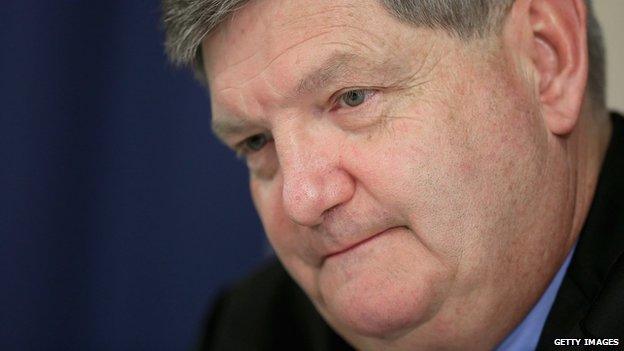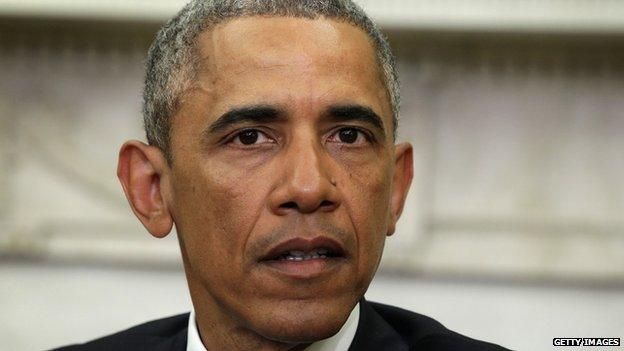Jeffrey Sterling's trial by metadata: Free speech stories
- Published
- comments
The US crackdown on whistleblowers has free speech activists concerned.
Call it guilt by metadata.
When a Washington, DC, area jury convicted Jeffrey Sterling of multiple counts of espionage, the smoking gun wasn't a key bit of classified information found in the former CIA officer's possession; it was a trail of phone calls and emails of unknown content.
The information about where those calls and emails went, however - to a New York Times journalist - was enough to convince a jury to send Sterling to prison for up to 80 years.
According to the US Justice Department, Sterling was providing national security reporter James Risen with details of a failed CIA attempt to undermine Iran's nuclear programme by having a Russian scientist code-named Merlin pass along intentionally flawed blueprints. Risen then exposed the operation in his 2005 book, State of War.
Sterling's motivation, prosecutors said, was to get revenge on his employer after he had unsuccessfully sued it for discriminating against him as one of the agency's only black officers.
"The defendant's unauthorised disclosures of classified information compromised operations undertaken in defence of America's national security," Attorney General Eric Holder said in a statement, external after the verdict was announced. "The disclosures placed lives at risk."
Some free speech advocates who covered the case warn that while Risen has become a cause celebre among journalists, Sterling's prosecution and conviction - which received much less coverage - could have a chilling effect on the willingness of government whistleblowers to share what they know.
The CIA, they say, sought to punish Sterling in part because he had told a Senate Intelligence Committee about his concerns with Merlin in 2003. Senate staffers, Sterling's defence attorneys insisted, could have just as easily been the source of Risen's reporting.

The government has evidence that James Risen and Jeffrey Sterling communicated
The government constructed a case based purely on circumstantial evidence, according to Marcy Wheeler, a freelance reporter who covered the trial. She says this has set a dangerous precedent for free speech rights in the US.
Sterling's conviction means the government can convict leakers without proving they revealed actual classified information. Instead, she contends, they only need to show that a leak allowed a journalist to unearth national security secrets at some later date.
"Sterling was convicted for the most part entirely on phone and email records with no content attached," she says. "There was no guarantee that it had to do with classified information."
Vague hints and insinuations are part and parcel of the Washington trade in information, Wheeler says, as reporters with stories to write and government officials with agendas to drive engage in a symbiotic relationship in the corridors of power.
A prime example is the famous episode in Richard Nixon's Watergate scandal, where a high-place source (Mark Felt, aka "Deep Throat) told Washington Post reporters to "follow the money" without providing specific details of the president's wrongdoing.
Now, Wheeler says, the Justice Department has received "de facto approval" to expand the reach of the Espionage Act - a World War 1 era law meant to target spies who help foreign governments - to include non-secret tips to reporters.
Sterling's case, says Norman Solomon of the Institute for Public Accuracy, is part of a larger effort by US President Barack Obama's administration to crack down on government employees who provide reporters with access to national security information without authorisation.
There have been eight such prosecutions so far - compared to only three in previous administrations. Sterling was the first to go to a jury trial, however. Six others reached plea bargains, and the seventh - Chelsea Manning, who gave diplomatic documents to Wikileaks - was convicted by court martial.

President Barack Obama has stepped up prosecution of government leakers
One of those who reached a plea bargain was John C Kirakaou. The first CIA officer charged with leaking information to the media, he was released on Monday after serving two years prison. He says he was singled out by the government because he exposed the agency's use of waterboarding during interrogations.
"My case was about torture," he told, external the New York Times. "The CIA never forgave me for talking about torture."
That the government is not only watching but aggressively cracking down on national security leakers, has forced reporters to be increasingly careful about how and when they contact potential sources. According to a recent Pew Research Center study, external, 64% of investigative journalists believe the US government "probably collected data about their communications".
Some media outlets are taking extra measures not only to secure their reporters' data but to provide a safe means for potential government whistleblowers to reach out to them. The Intercept, which has published and analysed extensive excerpts of documents provided by National Security Agency leaker Edward Snowden, is one of around a dozen media outlets that allow new sources to send files anonymously via a open-source service called SecureDrop.
"I think that awareness is growing," says Micah Lee, external, who helped set up and oversees the Intercept's security systems. "It used to be that journalists and people in general didn't really consider a lot of things. They just assumed that if they were having a phone conversation with a source and didn't tell anyone about that conversation, that meant that it was a secret. But you know, really it's not secret."
According to Solomon, the fact that journalists now have to take such extensive precautions is a reflection of a government that is becoming increasingly undemocratic.
"The flow of information in the national security arena is in lockdown under the Obama administration," Solomon says. "Democracy requires the informed consent of the governed. A clear aim of this administration is to have the uninformed consent of the governed."
The Sterling episode is another post-9/11 case of security versus freedom, Wheeler says, and once again the perceived interests of security are coming out on top.
"Throughout the trial there was this whole pretence that the government knows what's best for us, and anybody who would question it is at the very least interfering with security of the country," she says.
Sterling will be sentenced in April, although his lawyer tells the BBC that an appeal is in the works.
Blog by Anthony Zurcher, external
Watch more videos on our YouTube channel, external or follow BBC Trending on Twitter @BBCtrending, external.
All our stories are at bbc.com/trending